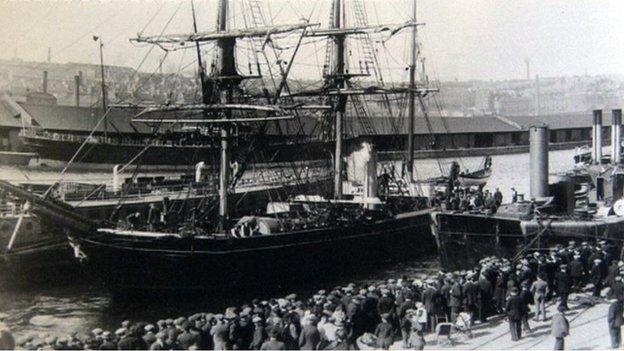50 years on: When Scotland stopped whaling
- Published
It is 50 years since the Edinburgh-based company Christian Salvesen ceased whaling operations, with the sale of its last two vessels. It marked the end of a controversial trade which had once been a vital part of Scottish industry.
In the 19th century, fleets of whalers left ports all along the east coast of Scotland, bound for the Arctic.
Malcolm Archibald, the author of a book on whale hunters, said it was vital for industry, particularly for the process of making jute fibre in Dundee.
He says: "The blubber, melted into oil from the whales would soften the jute so they could make it into material.
Extinct
"In the 19th century jute was vitally important for things like pioneers' tents, for wagon covers and for all the various wars they had," he said.

Malcolm Archibald says whales were important for the Dundee economy
"So the economy of Dundee was based to a large extent on the whaling."
By World War One hunting in the Arctic and northern Atlantic ended with many species of whale almost extinct.
Christian Salvesen, based in Leith, adopted Norwegian practices of sending huge factory ships to the Antarctic, where they processed whales caught by a fleet of catcher vessels.
Roddy Morrison was one of many men from the Western Isles who made the journey to other end of the world.
He says when a whale was harpooned, brakes on the line prevented the animal from getting away.
"You had to let the line go out, and then when it stopped, you started heaving it back in again.
"And then it would take off again, the same as a salmon. We hauled it in like that until we got it alongside."
Jock Murray, also from Lewis, spent the last winter of commercial whaling, half a century ago, at the shore base on South Georgia.
He published a book about his experiences - "The Whaler of Scotland Yard" - and said it was cold work - and often unpleasant.

Whaling ships left from ports along the east coast of Scotland
"If the whale was fresh, the blood was warm, and you could warm your hands in it.
Good money
"But if the whale was a week old - oh! it was rotten, and it wasn't a nice smell I can assure you."
Although it was good money, Roddy Morrison now has mixed feelings about his part in the whaling industry.
"In a way it was barbaric, but I am glad I did it, because it was a great experience," he says.
"But looking back in another way, it wasn't a good thing. I don't think we should be killing these beautiful animals."
Japan is one of a handful of nations still carrying out whaling.
There has been a global moratorium on commercial whaling since 1986.
But later this year the International Court of Justice in The Hague will hear a challenge later by Australia to Japan's continuing "scientific" programme.
It uses an exemption in international law, the officially named "Japanese Whale Research Program under Special Permit in the Antarctic", to justify the taking of fin and minke whales in a disputed sanctuary south of Australia.